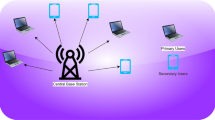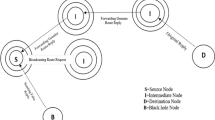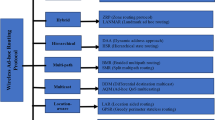Abstract
Inspired by the CONFIDANT protocol (Buchegger and Boudec in Proceedings of the 3rd ACM International Symposium on Mobile Ad Hoc Networking & Computing, pp. 226–236, 2002), we define and study a basic reputation-based protocol in multihop wireless networks with selfish nodes. Its reputation mechanism is implemented through the ability of any node to define a threshold of tolerance for any of its neighbors, and to cut the connection to any of these neighbors that refuse to forward an amount of flow above that threshold. The main question we would like to address is whether one can set the initial conditions so that the system reaches an equilibrium state where a non-zero amount of every commodity is routed. This is important in emergency situations, where all nodes need to be able to communicate even with a small bandwidth. Following a standard approach, we model this protocol as a game, and we give necessary and sufficient conditions for the existence of non-trivial Nash equilibria. Then we enhance these conditions with extra conditions that give a set of necessary and sufficient conditions for the existence of connected Nash equilibria. We note that it is not always necessary for all the flow originating at a node to reach its destination at equilibrium. For example, a node may be using unsuccessful flow in order to effect changes in a distant part of the network that will prove quite beneficial to it. We show that we can decide in polynomial time whether there exists a (connected) equilibrium without unsuccessful flows. In that case we calculate (in polynomial time) initial values that impose such an equilibrium on the network. On the negative side, we prove that it is NP-hard to decide whether a connected equilibrium exists in general (i.e., with some nodes using unsuccessful flows at equilibrium).










Similar content being viewed by others
Notes
We don’t assume any kind of synchronization amongst the nodes, but we do assume that the decision variables changes are instantaneous. Note that the game modeling the protocol is not a repeated game, and there isn’t any notion of rounds.
We thank an anonymous reviewer for helping to clarify this.
Note that the running time of Equil is polynomial in |V|,|E| and the number of commodities.
References
Buchegger, S., Le Boudec, J.-Y.: Performance analysis of the confidant protocol. In: Proceedings of the 3rd ACM International Symposium on Mobile Ad Hoc Networking & Computing, New York, USA, pp. 226–236 (2002). doi:10.1145/513800.513828
Buttyán, L., Hubaux, J.-P.: Stimulating cooperation in self-organizing mobile ad hoc networks. Mob. Netw. Appl. 8(5), 579–592 (2003)
Eidenbenz, S., Resta, G., Santi, P.: The commit protocol for truthful and cost-efficient routing in ad hoc networks with selfish nodes. IEEE Trans. Mob. Comput. 7(1), 19–33 (2008)
Grötschel, M., Lovász, L., Schrijver, A.: Geometric Algorithms and Combinatorial Optimization. Springer, Berlin (1988)
Hardin, G.: The tragedy of the commons. Science 162, 1243–1248 (1968)
He, Q., Wu, D., Khosla, P.: A secure incentive architecture for ad hoc networks: Research articles. Wirel. Commun. Mob. Comput. 6(3), 333–346 (2006). doi:10.1002/wcm.v6:3
Mahajan, R., Rodrig, M., Wetherall, D., Zahorjan, J.: Sustaining cooperation in multi-hop wireless networks. In: Proceedings of the 2nd Conference on Symposium on Networked Systems Design & Implementation, Berkeley, CA, USA, pp. 231–244 (2005). http://dl.acm.org/citation.cfm?id=1251203.1251220
Milan, F., Jaramillo, J.J., Srikant, R.: Achieving cooperation in multihop wireless networks of selfish nodes. In: Proceedings of the 2006 Workshop on Game Theory for Communications and Networks, New York, USA (2006). doi:10.1145/1190195.1190197
Srinivasan, V., Nuggehalli, P., Chiasserini, C.-F., Rao, R.: Cooperation in wireless ad-hoc networks. In: Proceedings of 22nd Annual Joint Conference of the IEEE Computer and Communications, pp. 808–817 (2003)
Zhong, S., Chen, J., Yang, Y.R.: Sprite: A simple, cheat-proof, credit-based system for mobile ad-hoc networks. In: Proceedings of 22nd Annual Joint Conference of the IEEE Computer and Communications, pp. 1987–1997 (2003)
Zhong, S., Li, L., Liu, Y., Yang, Y.: On designing incentive-compatible routing and forwarding protocols in wireless ad-hoc networks. Wirel. Netw. 13(6), 799–816 (2007)
Acknowledgements
We would like to thank the anonymous reviewer who pointed out that our results hold even when the nodes decide on (and then communicate) their edge flows, instead of deciding their path flows, as described in Sect. 2.
Author information
Authors and Affiliations
Corresponding author
Additional information
A preliminary version of this paper appeared in the Proc. 8th Latin American Theoretical Informatics Symposium (LATIN’ 08), April 2008, Rio de Janeiro, Brazil, LNCS, vol. 4957, pp. 350–361.
Research of G. Karakostas was supported by an NSERC Discovery Grant and MITACS.
Research of E. Markou was supported by MITACS. Part of this work was done during this author’s stay at the School of Computational Engineering & Science of the McMaster University, as a postdoctoral fellow.
Rights and permissions
About this article
Cite this article
Karakostas, G., Markou, E. Emergency Connectivity in Ad-hoc Networks with Selfish Nodes. Algorithmica 68, 358–389 (2014). https://doi.org/10.1007/s00453-012-9675-x
Received:
Accepted:
Published:
Issue Date:
DOI: https://doi.org/10.1007/s00453-012-9675-x




